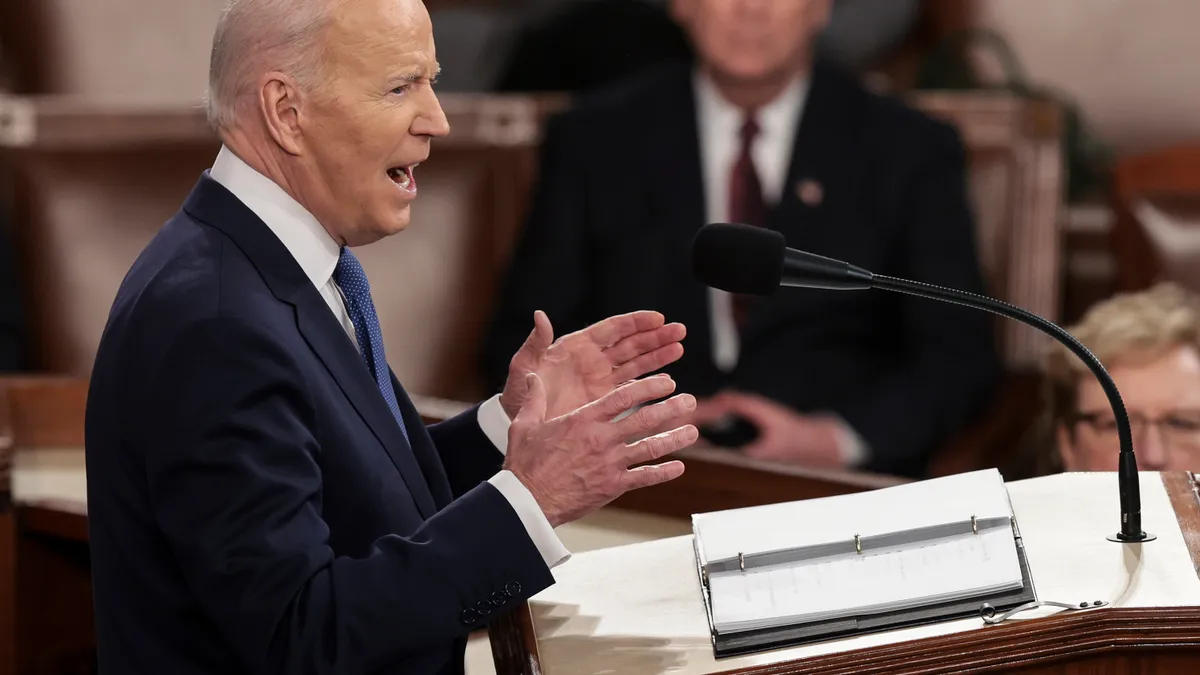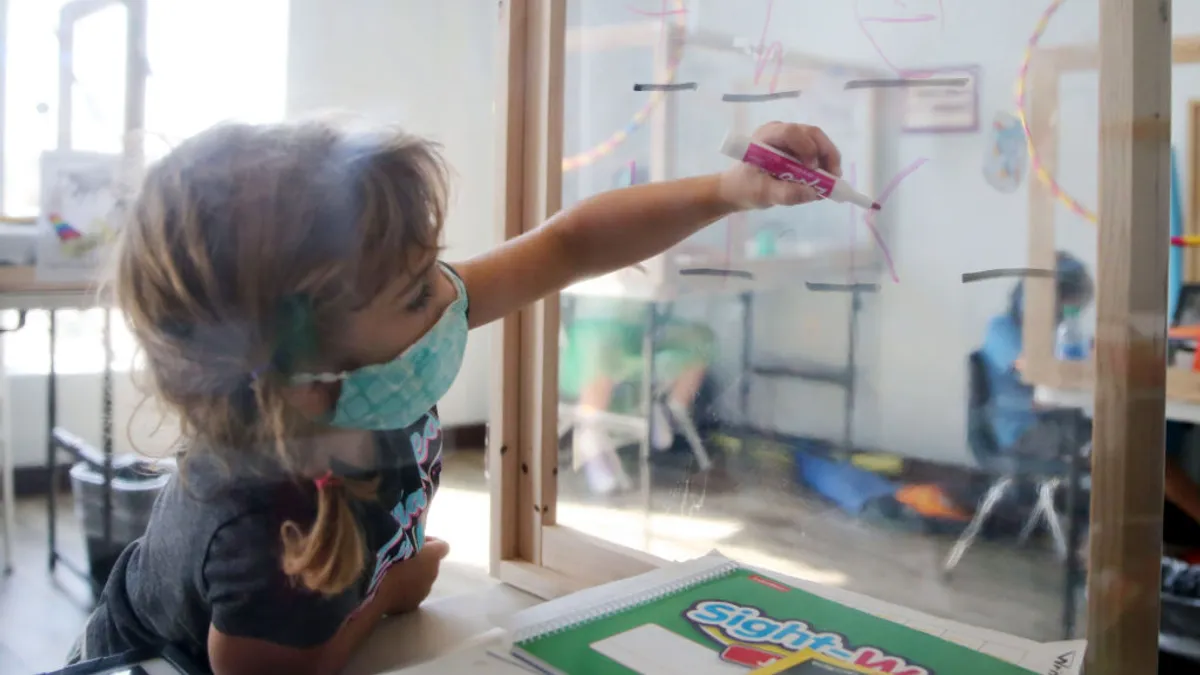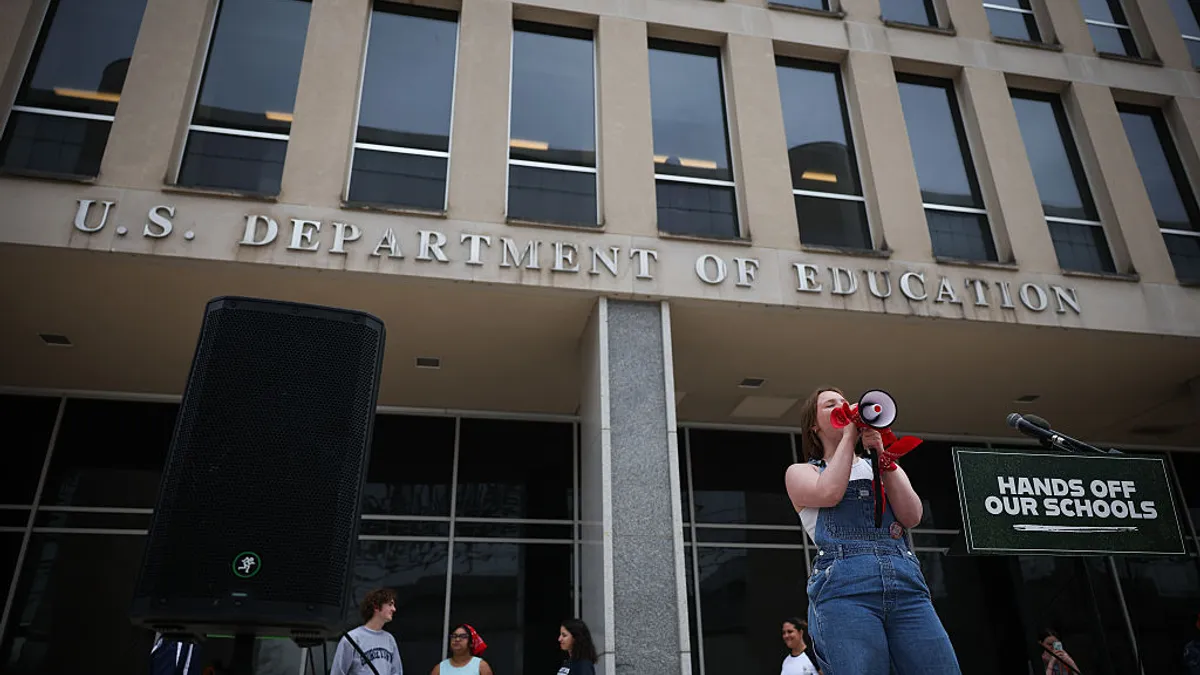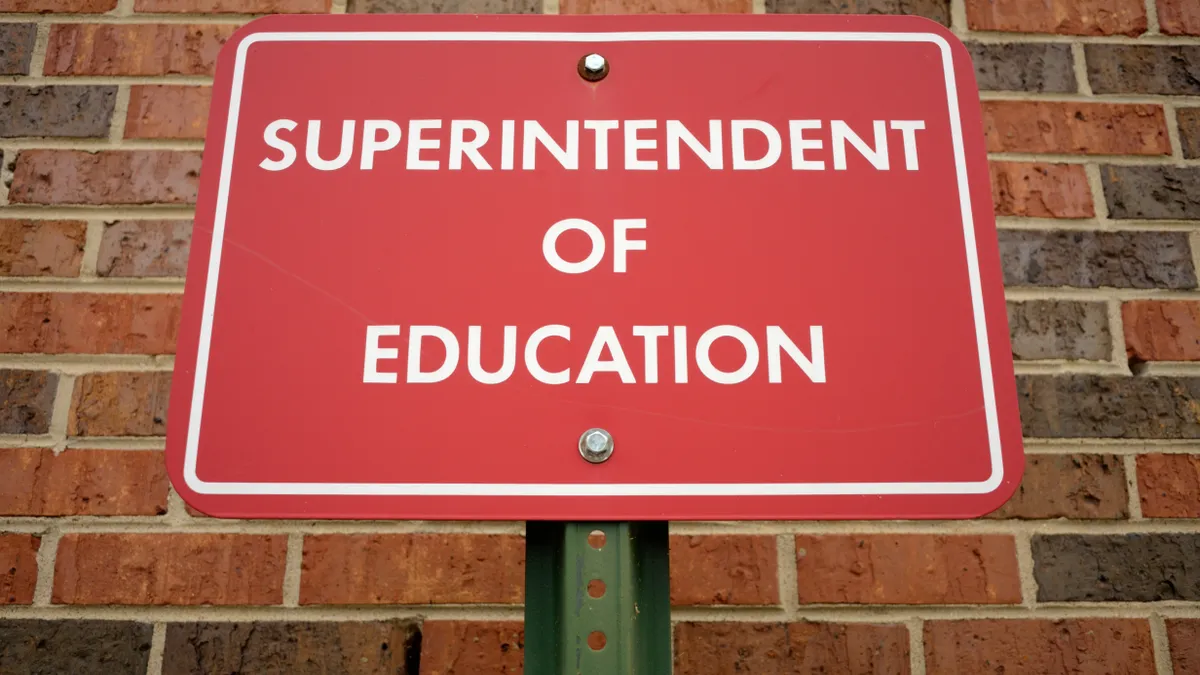UPDATE: March 11, 2022: The fiscal 2022 appropriations package cleared the Senate late Thursday night, sending it to President Joe Biden's desk.
The federal fiscal spending bill for 2022, which passed on Wednesday night in the House, significantly lowballed many key education programs that would have aided in K-12's recovery from COVID-19. The blow comes despite President Joe Biden's request for ambitious investments in Title I, special education and other programs.
One of Biden's largest proposals for the 2022 budget was to significantly increase Title I funding to $36.5 billion from $16.5 billion in 2021. The $20 billion increase would have brought Biden closer to making good on his promise to triple the federal program that he touted on his road to the White House.
"Addressing entrenched disparities in education is both a moral and economic imperative," Biden wrote in his April 2021 proposal for Title I. "This investment would provide historically under-resourced schools with the funding needed to deliver a high-quality education to all of their students."
This sentiment has been repeatedly echoed by U.S. Secretary of Education Miguel Cardona, who earlier this week said "it's unacceptable post-pandemic to go back to the funding levels that were there before the pandemic." He's also previously called specifically for increased funding for Title I schools.
The final spending bill, however, only bumped Title I grants to districts up by $1 billion, to $17.5 billion, a House document listing fiscal year 2022 spending levels shows.
The measure now moves toward Senate passage. A continuing resolution bill to finalize the FY 2022 budget expires Friday, but the House has approved an extension to that deadline to March 15.
A separate House Appropriations Committee budget document describes it as "largest increase in the program in more than a decade." Rep. Bobby Scott, D-Va., chairman of the House Committee on Education and Labor, echoed that sentiment in a statement, adding he was "pleased" with the increase.
However, Biden's request would have brought in $20 billion for a newly proposed Title I Equity Grant program, which instead went unfunded. K-12 advocates and policy experts criticized the lower level increase for Title I – which came in the form of targeted and education finance incentive grants — calling it a missed opportunity.
“The FY22 omnibus bill as it relates to education is, at best, a mixed bag," said Dan Domenech, executive director of AASA, The American Association of School Administrators, in a statement. Domenech acknowledged that while there were some increases in funding, "the bill misses the mark on what could have been, especially in the context of what had been proposed across the administration, House, and Senate."
Deborah Delisle, president and CEO of All4Ed, said in a statement that she was "encouraged" by the $1 billion increase. Delisle served as the U.S. assistant secretary of elementary and secondary education from 2012 to 2015.
“Although it is not the ambitious education funding package that it started out as, the bipartisan omnibus budget released today has some bright spots to help students, families, and educators," she said.
IDEA funding lags behind request
That bright spot, however, didn't extend to the Individuals with Disabilities Education Act, some advocates say.
While the president requested $15.5 billion for IDEA Part B state grants, the final bill provides $13.3 billion. That marks a $406 million increase from the year prior, but still misses the president's mark by nearly $2.2 billion.
"We were disappointed in the final numbers given that all of the previous FY 22 proposals we had seen showed significant increases to IDEA funding," said Lindsay Kubatzky, director of policy and advocacy for the National Center for Learning Disabilities, in an email. "Congress could've used this as an opportunity to take a significant step towards fulfilling their promise nearly 50 years ago to fully fund IDEA. Instead, the modest increase will force schools and districts to use more of their funds to cover the costs of supporting students with disabilities," Kubatzky said.
Domenech noted the level is a cut when compared to levels provided by the American Rescue Plan, which increased IDEA Part B funding by $2.5 billion to a total of $15.5 billion
"This omnibus was the first time in my career at AASA that Congress had a true opportunity to redirect itself forward on the IDEA glidepath," Domenech said. "The proposed level puts schools on an IDEA funding cliff and all but ensures that ARP IDEA dollars will go to one-time expenditures instead of sustainable quality investments."
Small increases set for other programs
Other areas where the spending bill trimmed Biden's request include full-service community schools and school safety national activities — both of which fall under Safe Schools and Citizenship Education.
Where Biden requested $443 million for full-service community schools, Congress allocated $75 million. That's still a $45 million increase from the $30 million in FY 2021.
And while Biden sought for $1.1 billion for school safety national activities — which included his request for school-based health professionals — Congress provided only $201 million. That's a $95 million increase from 2021, but $915 million less than requested.
Another cut to the president's budget plan came in the School Leader Recruitment and Support program for school innovation and improvement, which was not funded in 2021 and was zeroed out for 2022 despite Biden's request of $30 million. The funds would have covered improvements for recruitment, preparation, placement, support and retention of principals or other school leaders in high-needs schools.
It's a measure that has been supported by multiple professional and advocacy groups. The investment would have come as "school leaders across the country are facing unprecedented levels of burnout and pressure," said Ronn Nozoe, CEO of the National Association of Secondary School Principals, in a statement, when $198 million was proposed for the program in 2021.
Overall, the bill seemed to pass over Biden's lofty requests for a select number of key programs and instead raised by smaller amounts a greater number of programs that Biden either passed over or only slightly increased in his 2022 request.
Head Start early learning programming saw an increase of $288.7 million for a total of $11 billion. Biden had requested $11.9 billion.
Areas where the omnibus bill provided relatively smaller increases from 2021 include a $1 million bump in literacy grants to $29 million, a $12 million increase to $390 million for state assessments, a $7 million increase to $195 million for rural education funding, and $7.5 million more for education for homeless students, to $114 million.
"The overall challenge is that small programs tend to stay small, even if the problem they're addressing isn't small," said Barbara Duffield, executive director of SchoolHouse Connection, about the small bump for homeless youth education. "If you're not supported in attending school on a regular basis, then you're not going to benefit from Title I or special education or mental health supports or anything else."
Cardona: 'We have an opportunity and a responsibility'
The bill — which Domenech said shows "the disconnect" between education funding proposals and realities and left education leaders wanting more — comes two days after Cardona called for making transformational investments in education. His calls come despite educators balking at long-term financial commitments that could prove unsustainable once federal aid dries up.
"We have an opportunity and a responsibility to disrupt systems that didn't work in the past," he said. "So while I want to allow educators to catch their breath — because really they've been doing heroic work, especially during omicron — I really want to make sure that we're shifting now to transformative change, to innovation, to really boldly addressing inequities."
Cardona urged education leaders to advocate for ongoing and increased state and local funding, "just like the president and I are pushing for increased federal funding in Title I and IDEA."





















